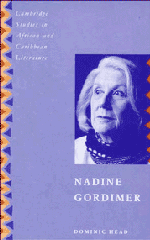Book contents
- Frontmatter
- Contents
- Preface
- List of abbreviations
- Chronology
- 1 Gordimer and South Africa: themes, issues and literary identity
- 2 The early novels: The Lying Days, A World of Strangers and Occasion for Loving
- 3 Developing narrative muscle: The Late Bourgeois World, A Guest of Honour and The Conservationist
- 4 The construction of identity: Burger's Daughter and July's People
- 5 Self-reflexive reassessments: A Sport of Nature and My Son's Story
- 6 The short stories
- 7 Conclusion. Gordimer: postmodernist?
- Notes
- Select bibliography
- Index
5 - Self-reflexive reassessments: A Sport of Nature and My Son's Story
Published online by Cambridge University Press: 05 July 2011
- Frontmatter
- Contents
- Preface
- List of abbreviations
- Chronology
- 1 Gordimer and South Africa: themes, issues and literary identity
- 2 The early novels: The Lying Days, A World of Strangers and Occasion for Loving
- 3 Developing narrative muscle: The Late Bourgeois World, A Guest of Honour and The Conservationist
- 4 The construction of identity: Burger's Daughter and July's People
- 5 Self-reflexive reassessments: A Sport of Nature and My Son's Story
- 6 The short stories
- 7 Conclusion. Gordimer: postmodernist?
- Notes
- Select bibliography
- Index
Summary
The most recent phase in Gordimer's novel sequence is characterized by a metafictional quality: this is not an entirely new development since there are deliberations about the function of technique and form in her previous novels. In A Sport of Nature (1987) and My Son's Story (1990), however, this tendency is both more pronounced and more overtly self-reflexive, focusing – often ironically – on her previous treatment of issues now taken up again. This principle of self-reflexive intertextuality in both novels makes their full signification dependent upon a knowledge of Gordimer's earlier work.
A SPORT OF NATURE
In some ways A Sport of Nature is Gordimer's most ambitious novel to date: it offers, as its organizing principle, an exaggerated re-evaluation of the issues and forms of her previous novels. This lends the book a ludic, metafictional quality which sets it apart from her earlier works. This novel is written at one remove: it is a book about her previous books, and this is what anchors a work that investigates the variety of interpretation to which personal and historical action can be subjected. The result is a novel which, viewed as a conventional work of realism, appears to be radically uncertain in its narrative stance, in its view of purposive political action, and in its conclusions about historical change.
- Type
- Chapter
- Information
- Nadine Gordimer , pp. 136 - 160Publisher: Cambridge University PressPrint publication year: 1994



